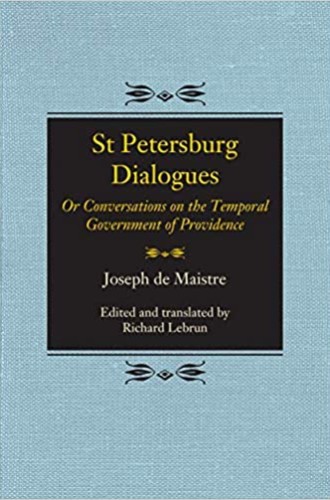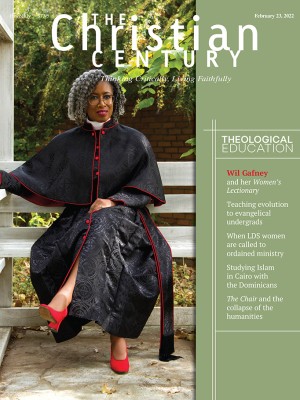Joseph de Maistre’s magnum opus is still perplexing after 200 years
Les soirées de Saint-Pétersbourg has often been dismissed as propaganda. It isn’t.
In 1990, as communist governments fell, political philosopher Isaiah Berlin published a 91-page trio of essays in the New York Review of Books examining the “terrifying prophet of our own day” whose works contained “the earliest notes of the militant antirational fascism” and “the heart of the totalitarianisms, both of the left and of the right, of our terrible century.” For Berlin, this evil genius of modernity was not Nietzsche, Hegel, or Marx. It was an unsuccessful French diplomat named Joseph de Maistre (1753–1821).
Most—though not all—scholars remember Maistre as a reactionary opponent of the French Revolution. But he was a nonviolent bureaucrat originally from the Kingdom of Sardinia (France’s ally). For over a decade (1803–1817), Maistre served as Sardinia’s ambassador in St. Petersburg, where he frequented salons and lived on a tiny stipend, plus whatever dinners he could sponge off Russian nobles. His habit of annoying his patrons meant that he repeatedly lost jobs; the tsar, for instance, expelled him. When the Congress of Vienna met to design a new international order, Maistre was pointedly not invited. He publicly criticized the congress’s decisions.
Read our latest issue or browse back issues.
Maistre would be a forgettable royal functionary—if he had not written 14 volumes of elegant French prose. The English translation of his greatest work, Les soirées de Saint-Pétersbourg (1821), is now available in paperback for the first time.
Berlin’s putative evidence for Maistre’s totalitarianism comes chiefly from Les soirées, an unfinished philosophical dialogue published a few months after Maistre’s death. Berlin pronounced Les soirées Maistre’s “masterpiece,” finding in it an irrationalist who believed in the divinity of war and praised the hangman as the keystone of society. Maistre himself called this dialogue his “great work,” containing “all that I can do and all that I can know.”
Les soirées feels nothing like propaganda. First, it is too long: 894 pages in the original edition, with hundreds of endnotes and quotations in a half dozen languages. Second, Maistre condemns the Old Regime elite as venal unbelievers, little different from highwaymen. No king is ever “unjustly slain” by his people, one character remarks, with Louis XVI in view.
As for the plot, three educated aristocrats gather after dinner on a series of warm summer nights in 1809 to discuss “the temporal governance of Providence.” Maistre’s literary models are Greco-Roman dialogues such as Plato’s Symposium and Gellius’s Attic Nights.
Maistre’s dialogue often digresses, covering topics such as comparative linguistics, Baconian method, Swedenborgianism, and the unpleasantness of Voltaire’s smile. But in essence the book is a theodicy. Suffering was close to Maistre. He was an impoverished refugee, driven from his home by French armies, his property seized, career frustrated, wife and children hundreds of miles away for years. Maistre seeks to justify God’s ways to man.
For centuries, most readers have identified the Count, the Senator, and the Chevalier—Maistre’s three otherwise nameless interlocutors—with actual individuals living in 1809. The rational émigré Count is thought to be a stand-in for Maistre himself, while various candidates have been proposed for the mystical Russian Orthodox Senator and the skeptical French Chevalier (knight). Maistre’s explicit debt to Plato, however, suggests that these characters may be better read as the three parts of Maistre’s own soul fighting within him, which he identifies as reason, perception, and will. In life, Maistre was a count and a senator—and arguably also a chevalier.
Over the course of the dialogue, the Chevalier returns to faith and becomes the book’s fictitious author. That is, Maistre’s false perception of the world’s chaos gets replaced by a vision of providential order. Moreover, although early in the dialogue the Count is the principal voice, the Senator gradually displaces him. Faith heals the will and surpasses reason.
Near the dialogue’s end—with the Count warning of heresy—the Senator summarizes “everything that can be known in rational philosophy.” He explains, this world is “a system of invisible things visibly manifested,” so “there is no Christian dogma that is not based on some tradition as universal and ancient as man.” The order of nature and the common practices of governments are evidence for revealed doctrine.
Maistre’s characters perceive natural sacraments in the most scandalous activities. An executioner breaking a criminal’s bones against the wheel is a sign of natural law. Hereditary syphilis is a sign of original sin. The blinding smoke and carnage of battle are a sign of salvation by faith. In a notorious passage, the Senator marvels that “in the vast domain of living things, there reigns an obvious violence . . . there are insects of prey, birds of prey, fish of prey, and quadrupeds of prey.” Man, he continues,
kills to nourish himself, he kills to clothe himself, he kills to adorn himself, he kills to attack, he kills to defend himself, he kills to instruct himself, he kills to amuse himself. . . . The entire earth, perpetually steeped in blood, is nothing but an immense altar on which every living thing must be immolated without end, without restraint, without respite, until the consummation of the world, until the extinction of evil, until the death of death.
Suffering and death dominate the natural and human realms alike.
But for Maistre, that horror does not disprove divine justice. It is evidence that God demands atonement and will restore all things on the last day. Indeed, Maistre trusted that the eschaton had begun. His critics view his sacramental hermeneutic as at best bizarre—and at worst, what Berlin called a “paranoiac world of modern fascism.” But surely the Senator’s speech is not far from God answering Job with the monstrous Leviathan (see Job 41). In the midst of revolutionary Europe, Maistre offered not a political program or treaty system but a way of perceiving the world.
Les soirées will never fit in a history of political thought, tucked in a chapter between Edmund Burke and Benjamin Constant. Maistre—with his focus on God and revelation, awe and anthropology, sin and blood sacrifice—fits better within the birth of liberal theology. Indeed, Friedrich Schleiermacher’s The Christian Faith appeared in 1821—the same year as Les soirées. In Les soirées, Maistre supplies a different answer to religion’s “cultured despisers.” Instead of turning inward to his feelings, Maistre looks out and challenges us to see, within the sufferings of this time, the glory to be revealed.
A version of this article appears in the print edition under the title “One man’s theodicy.”







